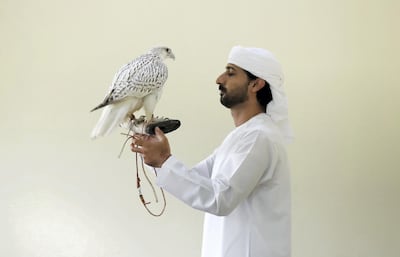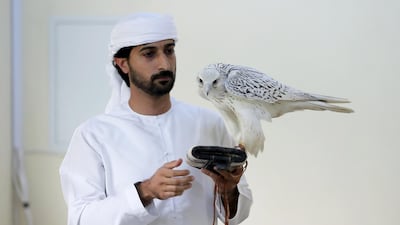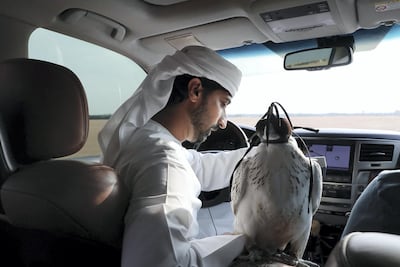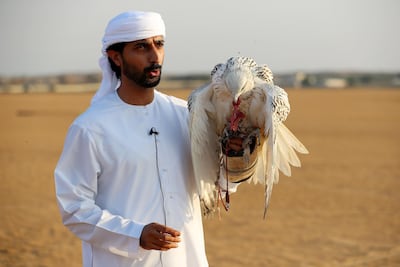In a market where the finest falcons can exchange hands for a million dirhams, incentives for smuggling wild chicks and eggs into the Middle East are high.
Huge financial rewards are at stake, fuelling an underground trade that is putting the future of Peregrine falcons and other birds of prey at risk.
But now one Emirati breeder is hoping his efforts may just help in putting a stop to the problem.
By successfully demonstrating he can produce birds bred from captive stock that are of equal quality to highly prized wild falcons, Mohammed Al Kamda hopes smuggling rates will fall.

“The demand for falcon trafficking has been driven by the belief that wild birds perform better as hunters,” he said.
“In the 1980s, captive bred falcons were more like chickens, so why would people want those rather than a wild falcon with natural hunting instincts?
“The question has always been how to get captivity bred falcons to perform as well as wild birds do.”
At his purpose built breeding centre on the edge of the Dubai desert in Al Awir, Mr Al Kamda now aims to change the thinking of Emirati falconers.
He currently has eight chambers where bred chicks can learn to fly and develop in much the same way as wild birds do.
Although numbers of wild Peregrine falcons have recovered from an endangered status of the 1970s thanks to captive breeding programmes, birds are still being stolen to order.
Inspectors from the Royal Society for the Protection of Birds in Scotland recently confirmed peregrines were being targeted by smugglers for the lucrative Middle East market.
Once in the Gulf, the chicks - which are preferred due to a perceived natural genetic hunting instinct - can command tens of thousands of dirhams in fees.
In 2016, the RSPB recorded 16 suspected peregrine chick robberies from nest sites in Scotland and elsewhere in the UK.
Today, Mr Al Kamda has two males and six female Gyrfalcons, the largest falcon species, to produce chicks using artificial insemination techniques he claims are the best in the region.
If adopted more widely, he insists captive bred birds could produce young of the highest quality – reducing demand for wild birds.
By replicating natural hunting techniques adult birds teach their young, he also claims he can develop captive bred birds every bit as fast and skilful as wild falcons.
“We have developed a way for these birds to learn how to fly freely as they would do in the wild,” Mr Al Kamda said.
“Young birds just want to be fed by their parents, then they begin to learn from the environment around them.
“They learn how to hunt, and return to us as if it is their nest. Birds born in the wild or in captivity have the same instincts.
“You don’t have to spend a fortune - understanding and learning how they would train naturally in the wild is very effective.”
________________
Read more:
Geneticists search for ‘Usain Bolt gene’ in falcons to produce better birds
Falcons released in Kazakhstan part of UAE conservation project
Portrait of a Nation: Emirati hopes to secure future of Arabia’s desert dog, the saluki
_________________
Currently, the UAE legally imports more than 3,500 captivity bred falcons each year.
But the country has also been criticised for being a prime destination for illegally smuggled birds since 2009, partially due to the UAE’s importance as a transit hub, but predominantly due to significant Emirati demand for protected falcons and other bird species.
Between 2009 and 2017, the UAE topped a global list of birds trafficked through airports, with 35 recorded cases. Brazil and the USA registered the second greatest number in that time with 23 each.
According to the most recent analysis by international wildlife monitors Traffic, every other known bird air seizure linked to the Middle East in 2017 involved falcons.
One recent falcon trafficking case originated in Kiev, Ukraine, and was destined for Dubai.
Three falcons were given sleeping pills, bound with tape and hidden in a specially modified suitcase with ice packs.
“One facility like mine will not wipe out the wild falcon smuggling overnight, but it can help,” said Mr Al Kamda.
“Hopefully others will prefer this method in future.
“Last year one of my birds caught a flamingo, it is fearless. One in a thousand birds would have this instinct.”
With falconry at the heart of Emirati heritage and a symbolic icon of national identity, breeding has become big business in the UAE.
The International Association for Falconry and Conservation of Birds of Prey (IAF) is a non-profit organisation founded to preserve the art of falconry.
It has 115 clubs and falconry institutions in more than 90 countries, representing more than 70,000 falconers around the world.
The Emrates Falconers’ Club (EFC) has been integral in preserving falconry in the UAE via the Sheikh Zayed Program by releasing more than 1,600 falcons to the wild and establishing the Abu Dhabi Falcon Hospital.
In October, Majid Ali Al Mansouri, secretary general of the EFC, was elected as president of the IAF.
“The UAE's leadership of the IAF is an extension of the efforts of Sheikh Zayed, the first falconer and one of the most important environmentalists in the world,” said Mr Al Mansouri.
“His vision reached what modern nature protectors later defined as sustainable hunting.”




